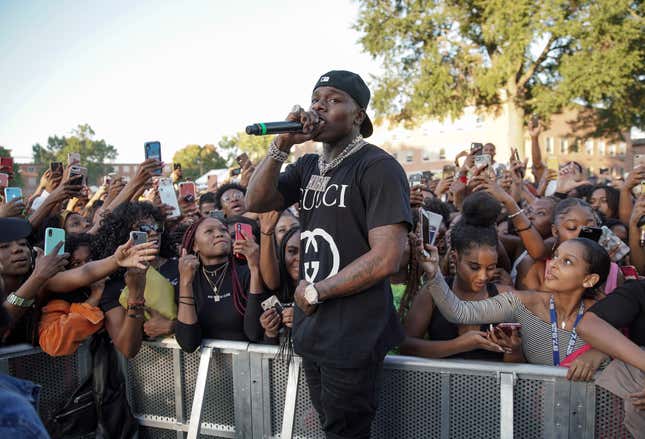
Content warning: This article discusses and refers to a potential suicide.
DaBaby is encouraging people to seek therapy after losing his brother earlier this week.
The 28-year-old rapper, born Jonathan Lyndale Kirk, reflected on his sibling’s death on his Twitter account Thursday. TMZ reported earlier this week that Glenn Johnson, DaBaby’s older brother, died by suicide. He was only 34 years old.
“If you can’t get over depression GET HELP,” DaBaby wrote, urging people who saw their loved ones struggling to try to lead them toward treatment.
“You suffer from PTSD take that shit serious & get help!” He continued. “I’m bouta get a therapist my damn self!”
Charlotte-Mecklenburg police found Johnson fatally wounded in northeast Charlotte, N.C. on Tuesday. The Mecklenburg Medical Examiner’s Office has not confirmed Johnson’s cause of death.
DaBaby has been mourning his brother publicly, changing his Instagram bio on Tuesday night to read, “LONG LIVE MY BROTHER.” He also referenced a line from his song “Intro,” in which he references his relationship to his older brother.
“My brother be thinkin’ that we don’t love him and let him struggle like we ain’t family,” the song goes. “Like I won’t give up all I got to see you happy.”
According to TMZ, Johnson appeared distressed in a video recorded shortly before his death. But while neither DaBaby nor local officials have confirmed that Johnson died by suicide, mental health issues in the Black community—particularly among Black men—are often underreported.
According to the mental health wellness and advocacy group Therapy for Black Men, young Black men are particularly vulnerable to suicide. Black men between the ages of 20 to 24 have the highest suicide rates in the Black community, and suicide is the third leading cause of death for all Black men between the ages of 15 and 24.
But despite the fact that Black people, generally, are 20 percent more likely to experience serious psychological distress than their white peers, young Black and Latino men experiencing anxiety and depression were also less likely to have used mental health treatments for their conditions.
Some of the factors that drive mental health issues, as well as prevent Black men from getting care, are systemic racism and discrimination, mistrust of healthcare providers, misdiagnoses and clinician bias, one study found. Because of this, informal interventions are key in aiding Black men to get the care they need: Some studies have found that Black men are more likely to seek help from other men they can relate to. Involvement from family members also tends to have a greater effect on improving mental health for Black people than for whites.
What certainly could help is if people with large platforms like DaBaby continue to call attention to mental health issues, lead by example and urge others to get the help they need.
If you or someone you know is considering suicide, please call the National Suicide Prevention Lifeline at 1-800-273-TALK (8255), text “STRENGTH” to the Crisis Text Line at 741-741, or visit suicidepreventionlifeline.org.

